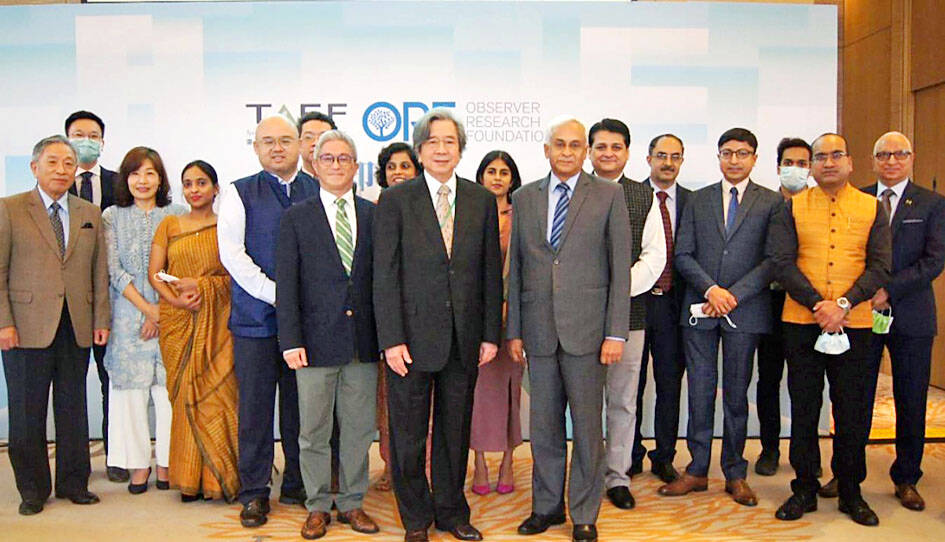Taiwan and India should build on each other’s complementary strengths, experts attending the inaugural Taiwan-India Dialogue in Taipei said.
The one-day closed-door meeting on Saturday featured more than 30 guests and panelists from Taiwan and India, including Indian lawmaker Sujeet Kumar and Ajit Manocha, president of global electronics trade association SEMI, the Taiwan-Asia Exchange Foundation (TAEF) said yesterday.
Former Indian Ministry of Electronics and Information Technology secretary Ajay Prakash Sawhney and India-Taipei Association director-general Gourangalal Das also participated in the forum, said the Taipei-based foundation, which organized the event.

Photo courtesy of the Taiwan-Asia Exchange Foundation
Foundation chairman Michael Hsiao (蕭新煌) and Observer Research Foundation (ORF) vice president Harsh V. Pant highlighted the importance of Taiwan-India relations in their opening remarks.
The New Delhi-based ORF cohosted the event.
As the government’s New Southbound Policy complements India’s Act East Policy, both sides should work more closely together on several niche areas where meaningful synergies could be created, Hsiao said.
Pant said that Taiwan and India are in influential positions with regard to the Indo-Pacific region and international security.
Both sides should harness the complementary nature of their respective policies to take bilateral ties forward, Pant said, underlining the importance of taking advantage of young leaders in Taiwan and India.
The dialogue comprised three sessions: examining the roles of Taiwan and India in safeguarding stability and security in the Indo-Pacific region; the use of bilateral economic and technology ties to promote regional prosperity and growth; and the prospects for the Taiwan-India partnership.
The exchange foundation said that it entered into a three-year partnership with the ORF in May and the dialogue is part of the agreement.
The two countries are to take turns hosting the event, it said.

The Chinese Communist Party (CCP) is pushing for residents of Kinmen and Lienchiang counties to acquire Chinese ID cards in a bid to “blur national identities,” a source said. The efforts are part of China’s promotion of a “Kinmen-Xiamen twin-city living sphere, including a cross-strait integration pilot zone in China’s Fujian Province,” the source said. “The CCP is already treating residents of these outlying islands as Chinese citizens. It has also intensified its ‘united front’ efforts and infiltration of those islands,” the source said. “There is increasing evidence of espionage in Kinmen, particularly of Taiwanese military personnel being recruited by the

Left-Handed Girl (左撇子女孩), a film by Taiwanese director Tsou Shih-ching (鄒時擎) and cowritten by Oscar-winning director Sean Baker, won the Gan Foundation Award for Distribution at the Cannes Critics’ Week on Wednesday. The award, which includes a 20,000 euro (US$22,656) prize, is intended to support the French release of a first or second feature film by a new director. According to Critics’ Week, the prize would go to the film’s French distributor, Le Pacte. "A melodrama full of twists and turns, Left-Handed Girl retraces the daily life of a single mother and her two daughters in Taipei, combining the irresistible charm of

A Philippine official has denied allegations of mistreatment of crew members during Philippine authorities’ boarding of a Taiwanese fishing vessel on Monday. Philippine Bureau of Fisheries and Aquatic Resources (BFAR) spokesman Nazario Briguera on Friday said that BFAR law enforcement officers “observed the proper boarding protocols” when they boarded the Taiwanese vessel Sheng Yu Feng (昇漁豐號) and towed it to Basco Port in the Philippines. Briguera’s comments came a day after the Taiwanese captain of the Sheng Yu Feng, Chen Tsung-tun (陳宗頓), held a news conference in Pingtung County and accused the Philippine authorities of mistreatment during the boarding of

ENTERTAINERS IN CHINA: Taiwanese generally back the government being firm on infiltration and ‘united front’ work,’ the Asia-Pacific Elite Interchange Association said Most people support the government probing Taiwanese entertainers for allegedly “amplifying” the Chinese Communist Party’s propaganda, a survey conducted by the Asia-Pacific Elite Interchange Association showed on Friday. Public support stood at 56.4 percent for action by the Mainland Affairs Council and the Ministry of Culture to enhance scrutiny on Taiwanese performers and artists who have developed careers in China while allegedly adhering to the narrative of Beijing’s propaganda that denigrates or harms Taiwanese sovereignty, the poll showed. Thirty-three percent did not support the action, it showed. The poll showed that 51.5 percent of respondents supported the government’s investigation into Taiwanese who have